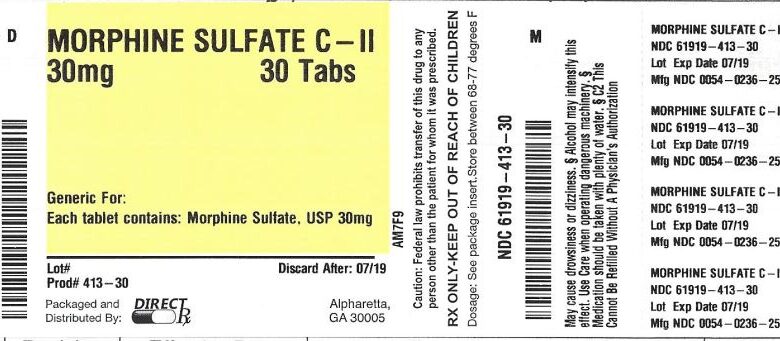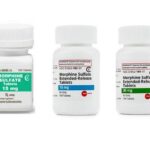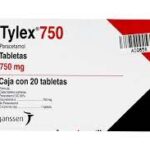Morphine Immediate-release 30mg: Uses Dosage, Side Effects, Addiction

Morphine Immediate-release 30 is morphine immediate-release tablet containing 30mg of the active ingredient. Morphine belongs to the class of medications called narcotic analgesics (pain relievers). These pain relievers are also known as opioid analgesics. This medication relieves severe pain when less potent pain relievers are not effective. Opioids decrease pain by working on the brain to increase pain tolerance. Morphine immediate release works quickly. It will usually relieve pain within about 30 minutes.
Your doctor may have suggested this medication for conditions other than those listed in this drug information article. If you have not discussed this with your doctor or are not sure why you are taking this medication, speak to your doctor. Do not stop taking this medication without consulting your doctor. Do not give this medication to anyone else, even if they have the same symptoms as you do. It can be harmful to people to take this medication if their doctor has not prescribed it.
How are Morphine Immediate-Release Tablets and Capsules best taken?
Use this medicine (morphine immediate-release tablets and capsules) as ordered by your doctor. Read all information given to you. Follow all instructions closely.
Take with or without food. Take with food if it causes an upset stomach.
• Do not inject or snort this medicine (morphine immediate-release tablets and capsules). Doing any of these things can cause very bad side effects like trouble breathing and death from overdose.
What do I do if I miss a dose?
• If you take this medicine (morphine immediate-release tablets and capsules) on a regular basis, take a missed dose as soon as you think about it.
• If it is close to the time for your next dose, skip the missed dose and go back to your normal time.
• Do not take 2 doses at the same time or extra doses.
• Many times, this medicine (morphine immediate-release tablets and capsules) is taken on an as-needed basis. Do not take more often than told by the doctor.
Who should NOT take this medication?
Do not take this medication if you:
- are allergic to morphine, other narcotic analgesics, or any ingredients of the medication
- are experiencing acute alcoholism or delirium tremens
- are experiencing psychosis caused by use of medications, drugs, or chemicals
- are experiencing acute asthma or other obstructive airway disease
- are experiencing acute respiratory depression
- are pregnant or breast-feeding, in labour, or delivering
- have abnormal heart rhythms
- have a blockage of the gastrointestinal tract, particularly paralytic ileus
- have a convulsive (seizure) disorder
- have a head injury, a brain tumour, or increased pressure inside the head or spinal cord
- have consumed alcohol or any medications containing alcohol
- have cor pulmonale
- have mild or intermittent, short term pain that can be treated with other medications
- have severe depression of the central nervous system (i.e., sedation)
- have a suspected abdominal condition that may require surgery
- have taken an MAO inhibitor such as phenelzine or tranylcypromine in the past 14 days
- have had surgery to create an anastomosis
- have had recent surgery of the liver, gall bladder, or bile ducts
What side effects are possible with this medication?
Many medications can cause side effects. A side effect is an unwanted response to a medication when it is taken in normal doses. Side effects can be mild or severe, temporary or permanent.
The side effects listed below are not experienced by everyone who takes this medication. If you are concerned about side effects, discuss the risks and benefits of this medication with your doctor.
The following side effects have been reported by at least 1% of people taking this medication. Many of these side effects can be managed, and some may go away on their own over time.
Contact your doctor if you experience these side effects and they are severe or bothersome. Your pharmacist may be able to advise you on managing side effects.
- changes in vision
- changes in sexual desire or activity
- confusion
- constipation
- decreased appetite
- difficult urination
- dizziness, lightheadedness, or feeling faint
- drowsiness
- dry mouth
- false sense of well-being
- headache
- itchiness
- loss of appetite
- irregular periods
- nausea
- nightmares or unusual dreams
- sweating
- trouble sleeping
- unusual tiredness or weakness
- vomiting
Although most of the side effects listed below don’t happen very often, they could lead to serious problems if you do not seek medical attention.
Check with your doctor as soon as possible if any of the following side effects occur:
- decreased coordination
- fast, slow, or pounding heartbeat
- hallucinations
- increased response to pain or burning sensations
- signs of blocked bowel (e.g., abdominal pain, severe constipation, nausea)
- skin rash
- withdrawal symptoms (e.g., nausea, vomiting, diarrhea, anxiety, shivering, cold and clammy skin, body aches, loss of appetite, sweating)
Stop taking this medication and seek medical attention immediately if any of the following occur:
- signs of overdose:
- cold, clammy skin
- confusion
- convulsions (seizures)
- dizziness (severe)
- drowsiness (severe)
- low blood pressure
- nervousness or restlessness (severe)
- pinpoint-sized pupils of eyes
- slow heartbeat
- slow or troubled breathing
- weakness (severe)
- signs of respiratory depression (e.g., slow, shallow, or weak breathing)
- signs of serious allergic reaction (e.g., abdominal cramps, difficulty breathing, nausea and vomiting, or swelling of the face and throat)
- symptoms of serotonin syndrome (e.g., confusion, fast heartbeat, hallucinations, restlessness, shaking, shivering, sudden jerking of muscles, sweating)
Some people may experience side effects other than those listed. Check with your doctor if you notice any symptom that worries you while you are taking this medication.
Are there any other precautions or warnings for this medication?
Before you begin using a medication, be sure to inform your doctor of any medical conditions or allergies you may have, any medications you are taking, whether you are pregnant or breastfeeding, and any other significant facts about your health. These factors may affect how you should use this medication.
Abdominal (stomach) conditions: Morphine and other narcotic medications may make the diagnosis of abdominal conditions more difficult or it may worsen these conditions. People who experience the slower-than-normal passage of material through the digestive system may experience more side effects from morphine sustained release. If you have abdominal problems, discuss with your doctor how this medication may affect your medical condition, how your medical condition may affect the dosing and effectiveness of this medication, and whether any special monitoring is needed.
Accidental use: Accidental ingestion or use of as little as one dose of morphine by someone for whom it has not been prescribed can lead to a fatal overdose. Children are especially at risk. Keep this medication out of sight and reach of children.
Alcohol and other medications that cause drowsiness: Do not combine this medication with alcohol or other medications (e.g., antidepressants, sleeping pills, anxiety medications) that cause drowsiness since additional drowsiness or suppressed breathing can occur and be dangerous and possibly life-threatening.
Asthma and other respiratory conditions: Morphine may cause increased breathing difficulty for people having an acute asthma attack, or those with chronic obstructive pulmonary disease (chronic bronchitis, emphysema) or other conditions that affect breathing. If you have asthma or another breathing disorder, discuss with your doctor how this medication may affect your medical condition, how your medical condition may affect the dosing and effectiveness of this medication, and whether any special monitoring is needed.
Breathing: Morphine can suppress breathing, particularly if taken by someone who has not taken morphine before. This is a serious, potentially life-threatening condition. If you are at risk for breathing difficulties such as asthma, discuss with your doctor how this medication may affect your medical condition, how your medical condition may affect the dosing and effectiveness of this medication, and whether any special monitoring is needed. Keep this and all medications out of reach of children.
Dependence and withdrawal: Drug addiction is usually not a problem for people who require this medication for pain relief. Physical dependence (a need to take regular doses to prevent physical symptoms) has been associated with narcotic analgesics such as morphine. Withdrawal symptoms may be experienced if the dose is significantly reduced or suddenly discontinued. These symptoms include seizures, irritability, sleep problems, agitation, tremors, diarrhea, abdominal cramps, vomiting, headache, muscle cramps, extreme anxiety, tension, restlessness, sweating, and confusion. Reducing the dose gradually under medical supervision can help prevent or decrease these withdrawal symptoms when this medication is no longer required for pain control.
Dizziness: Morphine and other narcotics may cause dramatically reduced blood pressure, resulting in dizziness and unsteadiness. To reduce the possibility of severe dizziness, rise slowly when standing from a sitting or lying position.
Drowsiness/reduced alertness: Morphine may impair the mental or physical abilities needed for certain potentially hazardous activities such as driving a car or operating machinery. Avoid these activities until you know how this medication affects you.
Head injuries: Morphine can cause increased pressure inside the head. If you have an acute head injury or other conditions that increase your intracranial pressure (pressure inside the head), discuss with your doctor how this medication may affect your medical condition, how your medical condition may affect the dosing and effectiveness of this medication, and whether any special monitoring is needed.
Kidney function: Kidney disease or reduced kidney function may cause this medication to build up in the body, causing side effects. If you have reduced kidney function or kidney disease, discuss with your doctor how this medication may affect your medical condition, how your medical condition may affect the dosing and effectiveness of this medication, and whether any special monitoring is needed.
Low blood pressure: Morphine can cause low blood pressure or make low blood pressure worse. If you experience severe dizziness, especially when standing from a lying or sitting position, contact your doctor.
Liver function: If you have reduced liver function or liver disease, discuss with your doctor how this medication may affect your medical condition, how your medical condition may affect the dosing and effectiveness of this medication, and whether any special monitoring is needed.
Medical conditions: Morphine may cause increased symptoms or reduce the symptoms of worsening illness for people with Addison’s disease, reduced thyroid function, enlarged prostate, stricture of the urethra, reduced pituitary function, anemia, severe malnutrition, active ulcerative colitis, and hypothyroidism (low thyroid). If you have any of these conditions, discuss with your doctor how this medication may affect your medical condition, how your medical condition may affect the dosing and effectiveness of this medication, and whether any special monitoring is needed.
Seizures: Morphine may worsen preexisting seizure disorders. If tolerance to the medication develops and the dosage is increased substantially above recommended levels, seizures may occur in people without a history of seizure disorders. If you have a seizure disorder, discuss with your doctor how this medication may affect your medical condition, how your medical condition may affect the dosing and effectiveness of this medication, and whether any special monitoring is needed.
Serotonin syndrome: Severe reactions are possible when morphine is combined with other medications that act on serotonin, such as tricyclic antidepressants and serotonin reuptake inhibitors (medications used to treat depression). Symptoms of a reaction may include muscle rigidity and spasms, difficulty moving, or changes in mental state including delirium and agitation. Coma and death are possible.
If you are taking antidepressants, discuss with your doctor how this medication may affect your medical condition, how your medical condition may affect the dosing and effectiveness of this medication, and whether any special monitoring is needed.
Pregnancy: This medication should not be used during pregnancy unless the benefits outweigh the risks. If you become pregnant while taking this medication, contact your doctor immediately. Infants born to mothers who have been taking morphine for long periods of time or who are physically dependent on morphine will also be physically dependent on the medication and may experience breathing difficulties as well as withdrawal symptoms.
Breast-feeding: This medication passes into breast milk. If you are a breastfeeding mother and are taking morphine sustained release, it may affect your baby. Talk to your doctor about whether you should continue breastfeeding.
Children: Accidental ingestion of this medication by children may lead to severe and even fatal consequences. Keep this medication out of the reach of children.
Seniors: Seniors may be more sensitive to the effects of morphine and may require lower doses.
What other drugs could interact with this medication?
There may be an interaction between morphine and any of the following:
- aclidinium
- alcohol
- aldesleukin
- aliskiren
- alpha-agonists (e.g., clonidine, methyldopa)
- alpha-blockers (e.g., alfuzosin, doxazosin, tamsulosin)
- amiodarone
- amphetamines (e.g., dextroamphetamine, lisdexamfetamine)
- angiotensin converting enzyme inhibitors (ACEIs; captopril, enalapril, ramipril)
- angiotensin receptor blockers (ARBs; e.g., candesartan, irbesartan, losartan)
- antihistamines (e.g., cetirizine, doxylamine, diphenhydramine, hydroxyzine, loratadine)
- antipsychotics (e.g., chlorpromazine, clozapine, haloperidol, olanzapine, quetiapine, risperidone)
- atropine
- azelastine
- “azole” antifungals (e.g., itraconazole, ketoconazole, voriconazole)
- barbiturates (e.g., butalbital, pentobarbital, phenobarbital)
- belladonna
- benzodiazepines (e.g., alprazolam, diazepam, lorazepam)
- beta-blockers (e.g., atenolol, metoprolol, propranolol)
- benztropine
- bromocriptine
- buprenorphine
- buspirone
- butorphanol
- calcium channel blockers (e.g., amlodipine, diltiazem, nifedipine, verapamil)
- cannabis
- chloral hydrate
- clopidogrel
- cyclosporine (systemic)
- darifenacin
- desmopressin
- dexamethasone
- disopyramide
- diuretics (water pills; e.g., furosemide, hydrochlorothiazide, triamterene)
- domperidone
- dronedarone
- efavirenz
- elagolix
- eluxadoline
- entacapone
- flavoxate
- flibanserin
- general anesthetics (medications used to put people to sleep before surgery)
- glycopyrrolate
- ipratropium
- ketotifen
- lapatinib
- linezolid
- methylene blue
- metoclopramide
- mirtazapine
- monoamine oxidase inhibitors (MAOIs; e.g., moclobemide, phenelzine, rasagiline, selegiline, procarbazine, tranylcypromine) taken within the past 14 days
- muscle relaxants (e.g., baclofen, cyclobenzaprine, methocarbamol, orphenadrine)
- nabilone
- naltrexone
- nitrates (e.g., nitroglycerin, isosorbide dinitrate, isosorbide mononitrate)
- obinutuzumab
- octreotide
- other narcotic analgesics (e.g., codeine, fentanyl, meperidine, oxymorphone)
- oxybutynin
- pegvisomant
- phosphodiesterase 5 inhibitors (e.g., sildenafil, tadalafil, vardenafil)
- pramipexole
- prasugrel
- quinidine
- quinine
- reserpine
- rifabutin
- rifampin
- ropinirole
- rotigotine
- sacubitril
- St. John’s wort
- scopolamine
- seizure medications (e.g., carbamazepine, clobazam, levetiracetam, phenobarbital, phenytoin, primidone, topiramate, valproic acid, zonisamide)
- selective serotonin reuptake inhibitors (SSRIs; e.g., citalopram, fluoxetine, paroxetine, sertraline)
- serotonin/norepinephrine reuptake inhibitors (SNRIs; e.g., desvenlafaxine, duloxetine, venlafaxine)
- sodium oxybate
- solifenacin
- tapentadol
- tenofovir
- thalidomide
- ticagrelor
- ticlopidine
- tiotropium
- tolcapone
- tolterodine
- tramadol
- trazodone
- tricyclic antidepressants (e.g., amitriptyline, clomipramine, desipramine, trimipramine)
- umeclidinium
- zolpidem
- zopiclone
If you are taking any medications that have a sedating effect, speak with your doctor or pharmacist. Depending on your specific circumstances, your doctor may want you to:
- stop taking one of the medications,
- change one of the medications to another,
- change how you are taking one or both of the medications, or
- leave everything as is.
An interaction between two medications does not always mean that you must stop taking one of them. In many cases, interactions are intended or are managed by close monitoring. Speak to your doctor about how any drug interactions are being managed or should be managed.
Medications other than those listed above may interact with this medication. Tell your doctor or prescriber about all prescriptions, over-the-counter (non-prescription), and herbal medications that you are taking. Also, tell them about any supplements you take. Since caffeine, alcohol, nicotine from cigarettes, or street drugs can affect the action of many medications, you should let your prescriber know if you use them.
MIR 30mg Safety Information
- This medicine is a strong pain drug that can put you at risk for addiction, abuse, and misuse. Misuse or abuse of this medicine (morphine immediate-release tablets and capsules) can lead to overdose and death. Talk with your doctor.
- You will be watched closely to make sure you do not misuse, abuse, or become addicted to this medicine (morphine immediate-release tablets and capsules).
- This medicine may cause very bad and sometimes deadly breathing problems. Call your doctor right away if you have slow, shallow, or trouble breathing.
- The chance of very bad and sometimes deadly breathing problems may be greater when you first start this medicine (morphine immediate-release tablets and capsules) or anytime your dose is raised.
- Even one dose of this medicine (morphine immediate-release tablets and capsules) may be deadly if it is taken by someone else or by accident, especially in children. If this medicine (morphine immediate-release tablets and capsules) is taken by someone else or by accident, get medical help right away.
- Keep all drugs in a safe place. Keep all drugs out of the reach of children and pets.
- This medicine has an opioid drug in it. Severe side effects have happened when opioid drugs were used with benzodiazepines or other drugs that may make you drowsy or slow your actions. This includes slow or troubled breathing and death. Benzodiazepines include drugs like alprazolam, diazepam, and lorazepam. Benzodiazepines may be used to treat many health problems like anxiety, trouble sleeping, or seizures. If you have questions, talk with your doctor.
- Many drugs interact with this medicine (morphine immediate-release tablets and capsules) and can raise the chance of side effects like deadly breathing problems. Talk with your doctor and pharmacist to make sure it is safe to use this medicine (morphine immediate-release tablets and capsules) with all of your drugs.
- Do not take with alcohol or products that have alcohol. Unsafe and sometimes deadly effects may happen.
- Get medical help right away if you feel very sleepy, very dizzy, or if you pass out. Caregivers or others need to get medical help right away if the patient does not respond, does not answer or react like normal, or will not wake up.
- Using this medicine (morphine immediate-release tablets and capsules) for a long time during pregnancy may lead to withdrawal in the newborn baby. This can be life-threatening. Talk with the doctor.





